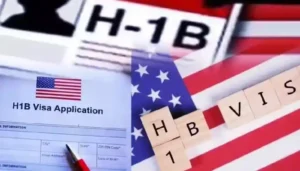United States has announced a steep increase in the annual fee for H-1B visas, raising it to $100,000 per application.
The move, formalized through a presidential proclamation signed by President Donald Trump, is expected to significantly impact Indian IT companies and professionals who have long relied on the H-1B program to support operations and client services in the US.
Legal experts and industry leaders have warned that the new fee structure could erode competitiveness, disrupt business models, and force companies to reassess their hiring and expansion strategies.
Sajai Singh, Partner at JSA Advocates and Solicitors, stated that the fee hike will escalate cost allocations for firms heavily dependent on H-1B visas, potentially leading to a shift in global delivery models.
H-1B Visa Fee Hike: Indian IT Firms Face Strategic Crossroads
India’s $283 billion IT sector, which includes major players like Tata Consultancy Services (TCS), Infosys, and Wipro, has historically been one of the largest beneficiaries of the H-1B visa program.
The program allows US companies to hire foreign professionals in specialized fields. In recent years, Indian nationals have accounted for over 70% of H-1B holders.
The new fee—up from a previous range of $2,000 to $5,000—comes at a time when Indian IT firms are already navigating macroeconomic uncertainties, delayed client decision-making, and the disruptive effects of artificial intelligence.
Sajai noted that companies may now be compelled to hire and train local talent in the US.
This shift could lead to a more localized workforce and reduced reliance on cross-border mobility.
Startups and Smaller Firms Hit Hardest
Large IT firms may absorb the increased costs through operational adjustments. Early-stage startups and mid-sized companies, however, face a more difficult path.
The $100,000 fee per employee could deter expansion plans for many companies. AI and SaaS startups that depend on US market access for growth may be especially affected.
Garry Tan, CEO of Y Combinator, emphasized that early teams cannot afford such costs, calling the fee a “luxury work permit” that excludes smaller players.
Hemant Mohapatra of Lightspeed India calculated that the new fee would have cost him $1.5 million over his 15-year H-1B tenure.
This amount exceeds his total earnings during that period.
Potential for Reverse Brain Drain and Domestic Innovation
Several Indian tech leaders view the policy shift as an opportunity to strengthen domestic innovation.
Snapdeal co-founder Kunal Bahl and Zoho’s Sridhar Vembu have encouraged Indian professionals to return home.
They believe this will help them build resilient careers in India.
Former NITI Aayog CEO Amitabh Kant argued that the fee hike could “turbocharge” India’s tech ecosystem.
He believes it will redirect talent and investment to cities like Bengaluru, Hyderabad, and Pune.
Some startups, such as Prodigal and SaaS Labs, have already begun hiring locally in the US.
They are also expanding operations in alternative hubs like Mexico, Canada, and Eastern Europe.
Founders say the shift may accelerate adoption of remote-first models and AI-driven efficiencies.
Note: We are also on WhatsApp, LinkedIn, and YouTube to get the latest news updates. Subscribe to our Channels. WhatsApp– Click Here, YouTube – Click Here, and LinkedIn– Click Here.



